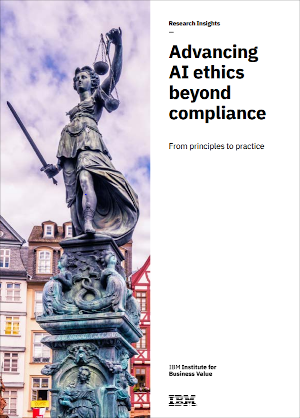Recent Release | 31 Mar 2020
Advancing AI Ethics beyond compliance

Thought Leadership Team
Oxford Economics

As AI adoption rapidly increases, it’s critical that AI ethics progress from abstract theories to concrete practices.
Oxford Economics worked with the IBM Institute for Business Value to survey 1,250 global executives in late 2018. Representing 20 industries and over 26 countries on 6 continents, survey participants included members of boards of directors, chief executive officers (CEOs), chief information officers (CIOs), chief technology officers (CTOs), chief data officers (CDOs), chief human resource officers (CHROs), chief risk officers (CROs), general counsels, and government policy officials.
We set out to answer three overarching questions with our research, addressed in this report:
- What is most important in ethically harnessing the power of AI?
- Who is responsible for helping ensure that ethics are integrated into AI, within corporations and outside?
- How can society best use AI?
Our Thought Leadership team produces original, evidence-based research made accessible to decision-makers and opinion leaders.
Oxford Economics’ team is expert at applying advanced economic tools that provide valuable insights into today’s most pressing business, financial, and policy issues.
Related Services

Post
KPMG M&A Outlook 2026: Between Uncertainty, Resilience, and Seizing Opportunities
Discover how Germany’s M&A landscape is evolving – with a focus on growth, AI and post-merger value creation.
Find Out More
Post
Silver, the next generation metal
This report highlights the critical role silver plays in data centres and artificial intelligence (AI), automotive and electric vehicles (EVs), and solar energy photovoltaics (PVs). With these sectors expected to expand significantly over the coming years, we expect future silver demand to be strong.
Find Out More
Post
Powering the UK Data Boom: The Nuclear Solution to the UK’s Data Centre Energy Crunch
The UK’s data centre sector is expanding rapidly as digitalisation, cloud computing, and artificial intelligence (AI) drive surging demand for high-performance computing infrastructure.
Find Out More